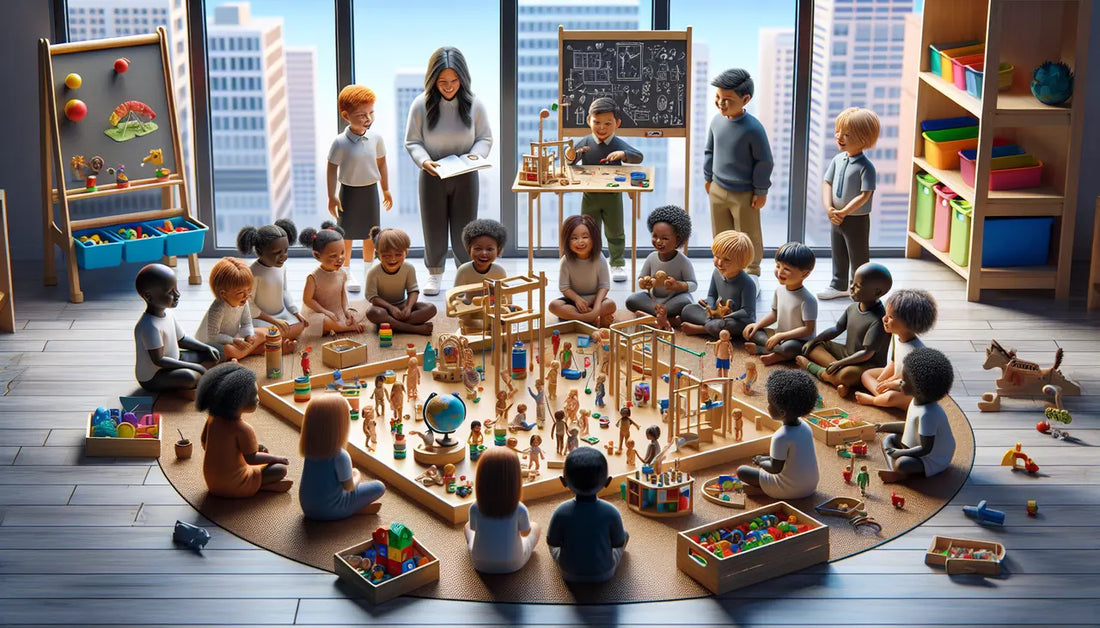Introduction to Montessori Toys and Educational Play
Montessori toys aren't just any toys. They're designed with a purpose – to help kids learn and grow. Unlike the usual toys that do everything for the child, Montessori toys encourage kids to explore, imagine, and develop skills on their own. It's all about educational play. This means playtime isn't just fun but a key part of learning. Through Montessori toys, kids figure out how to solve problems, develop their senses, and even start to grasp math and language basics. They're simple in design but powerful in impact. These toys adapt to the child's needs, growing with them. So, whether it's a wooden puzzle, beads for counting, or objects for sorting, each toy has a role in building a solid foundation for lifelong learning. It's hands-on learning at its best, where every play session is a step toward independence and intellectual growth.

What Makes Montessori Toys Different?
Montessori toys stand out because they're crafted with purpose and simplicity. These toys are not just playthings; they're tools designed to help kids learn and grow. They do this by focusing on tasks that children can master at their own pace. Unlike flashy, battery-operated toys that do all the work for the child, Montessori toys encourage kids to use their imagination, solve problems, and develop fine motor skills.
A key feature of Montessori toys is their use of natural materials like wood, cotton, and metal. This choice isn't just about aesthetics; it's about safety and durability. Plus, these materials offer different textures, weights, and temperatures for children to explore, making the learning experience richer.
Montessori toys are also age-specific, tailored to meet the developmental needs of kids at various stages of growth. From simple puzzles and stacking rings for toddlers to more complex construction sets for older children; these toys evolve with your child. They help build a strong foundation in areas like math, language, and science, without the child even realizing they're learning.
In short, Montessori toys simplify the complex world of learning by encouraging kids to engage in meaningful play. They're about sparking curiosity, nurturing creativity, and building confidence, one playtime at a time.
The Role of Montessori Toys in Child Development
Montessori toys play a crucial role in child development by promoting independence, sparking curiosity, and honing essential skills. Unlike regular toys, which might do the entertaining for kids, Montessori toys encourage children to explore and learn at their own pace. They're deliberately designed to be simple and based on real-life scenarios, which helps kids understand and interact with the world around them. These toys focus on activities that kids can do by themselves, promoting self-reliance. For example, a toy might be made to practice tying shoelaces or buttoning up clothes. This way, children aren't just playing but gaining life skills. Plus, these toys grow with the child. They're made to challenge kids just enough to keep them engaged without overwhelming them. As they master one level, they move on to more complex tasks, which is fantastic for their developing brains. In short, Montessori toys are more than just toys; they're tools that guide kids through their developmental milestones, making learning a natural and enjoyable part of their day.
Cognitive Benefits of Using Montessori Toys
Montessori toys aren't just toys. They're tools that help kids learn while they play. When kids use Montessori toys, their brains get a workout. They learn to solve problems, understand how things work, and become better at focusing. These toys are simple but smart. They're designed to match what kids need to learn at different ages. So, when a toddler plays with a puzzle that fits just right for their little hands, they're not just playing. They're building brain muscles. Think of it like this: every time they sort shapes, match colors, or stack blocks, they're doing brain push-ups. These activities boost their thinking skills, and memory, and even help them with reading and math later on. In short, Montessori toys set up kids for a big win in school and in life.

Enhancing Fine Motor Skills Through Montessori Toys
Montessori toys are designed to do more than just entertain. They’re tools that help kids develop essential skills, and one key area they shine in is improving fine motor skills. Think about it—when kids engage with Montessori toys, they're not just playing. They're learning to grasp, pinch, twist, and turn. All these actions are building blocks for fine motor skills. Why does this matter? Fine motor skills are critical for everyday tasks like writing, buttoning a shirt, or tying shoelaces. Using toys like bead threading sets, puzzle pieces, and blocks, kids practice and refine these skills without even realizing it. It’s learning masked as fun. The beauty of Montessori toys lies in their simplicity and focus on practical life skills. So next time you see a child playing with a Montessori toy, remember they're not just playing; they're developing abilities that will serve them for life.
How Montessori Toys Foster Independence and Creativity
Montessori toys are designed to do more than just entertain. They're about helping kids learn to do things by themselves, sparking their imagination. Here's the deal: Montessori toys are simple. They're often made from natural materials and don't have lots of bells and whistles. This simplicity encourages children to explore and use their creativity to play. Since these toys don't dictate how to play, kids make their own rules. This not only fuels their imagination but teaches them to think independently.
Think about it like this - when a child plays with a Montessori toy, they're not just following instructions. They're figuring things out for themselves, whether it's solving a puzzle or building something from scratch. They learn by trial and error, which is a powerful way to build confidence and independence.
Also, by engaging with these toys, kids develop both fine and gross motor skills. Handling small objects or balancing on a beam requires physical effort and coordination. And as they get better, their confidence soars.
In summary, Montessori toys strip away the unnecessary distractions and focus on the essentials of play. This simplicity is powerful. It teaches kids to rely on their creativity and develop a can-do attitude. That's the beauty of Montessori toys - they create a learning experience that shapes independent, imaginative thinkers.
Social and Emotional Growth with Montessori Play
When it comes to growing up, learning how to interact and understand feelings is just as crucial as academics. Montessori play lays down a strong foundation for this. Kids learn to share, wait their turn, and develop empathy by engaging with Montessori toys. These toys are designed to reflect real-life activities, pushing kids to work on tasks by themselves or in groups, navigate challenges, and understand the emotions of others. This self-directed play boosts confidence and independence. By learning to manage feelings and solve conflicts on their own, youngsters are gearing up for real-world challenges. Montessori isn't just about smart learning; it's about building smart, well-rounded individuals ready to take on life with a strong emotional toolkit.

Selecting the Right Montessori Toys for Your Child
Choosing the right Montessori toys for your kid is less about shelling out heaps of cash and more about understanding your child’s developmental stage. Montessori toys are designed to match kids' natural interests and encourage them to learn through play. Look for toys that challenge your child without frustrating them. For toddlers, focus on toys that develop fine motor skills, like simple puzzles or blocks. Older children might enjoy more complex activities, such as crafting kits or science experiments. A good Montessori toy should be made from natural, durable materials and have a specific purpose. It should be simple, with no flashy lights or electronic parts – these toys encourage kids to use their imagination and problem-solving skills. Most importantly, watch your child play. Seeing what grabs their attention can guide you to the perfect toy. Remember, the aim is not to overwhelm with quantity but to inspire with quality.
Incorporating Montessori Toys into Daily Play Routines
Bringing Montessori toys into your daily play routines isn't tough. Start by picking toys that match your child's age and interest. These toys are designed to boost learning by doing. For example, a simple wooden puzzle can teach problem-solving. The key? Keep it fun and pressure-free. Here's how:
- Rotate toys regularly - Kids get bored. Rotating toys keeps their interest high.
- Create a dedicated space - A specific play area encourages kids to engage deeply.
- Involve them in the choice - Letting kids choose what to play with boosts their independence.
- Focus on one toy at a time - This helps children concentrate and master one skill before moving on.
- Play alongside them sometimes - Your involvement can guide them and make learning more effective.
Remember, Montessori toys aren't just about playing. They're about learning life skills hands-on. By making these toys a part of daily routines, you're setting up a fun, educational environment that encourages curiosity and growth.
Conclusion: Maximizing the Impact of Montessori Toys on Learning
To wrap up, it's clear that Montessori toys aren't just toys; they're keys to unlocking your child's learning potential. Remember, the real magic happens when you choose toys that match your child's developmental stage and interests. Mixing it up with a variety of Montessori toys ensures they get a well-rounded experience - from solving puzzles to crafting stories with blocks. Also, being directly involved in playtime not only strengthens your bond with your child but also enhances the learning experience. Keep it simple, focus on quality over quantity, and watch your little one explore, learn, and grow. In the end, the goal is to provide an environment where learning through play is not just effective; it's a joy.


